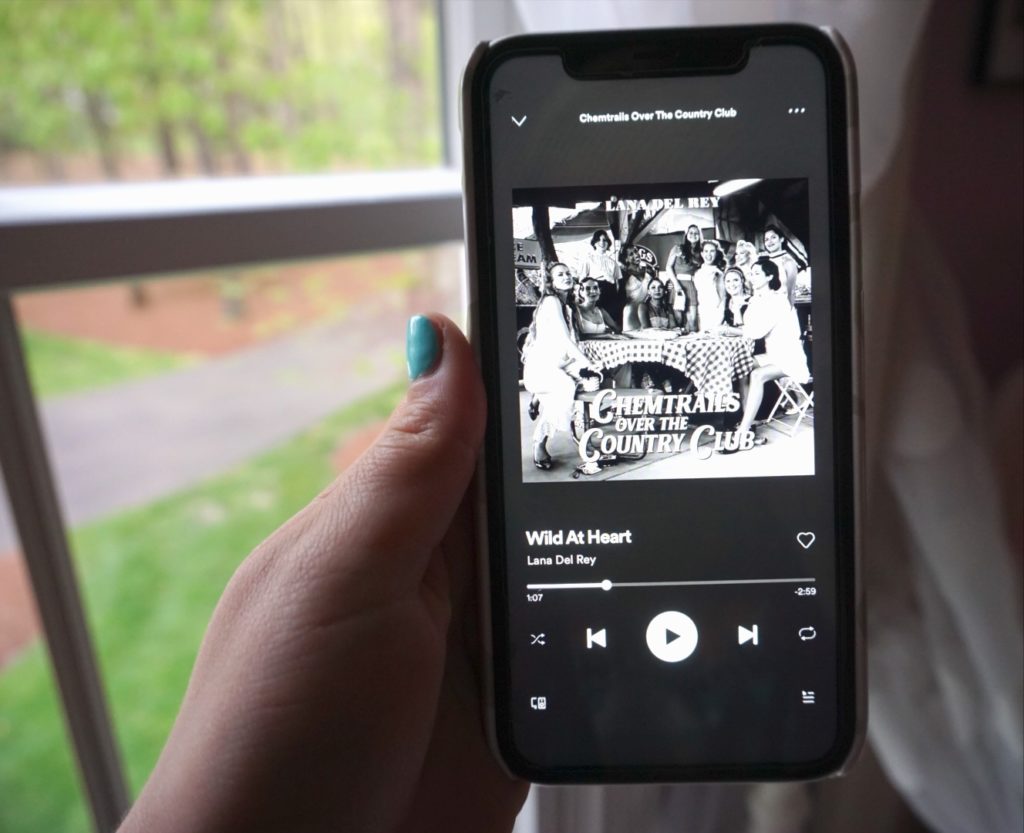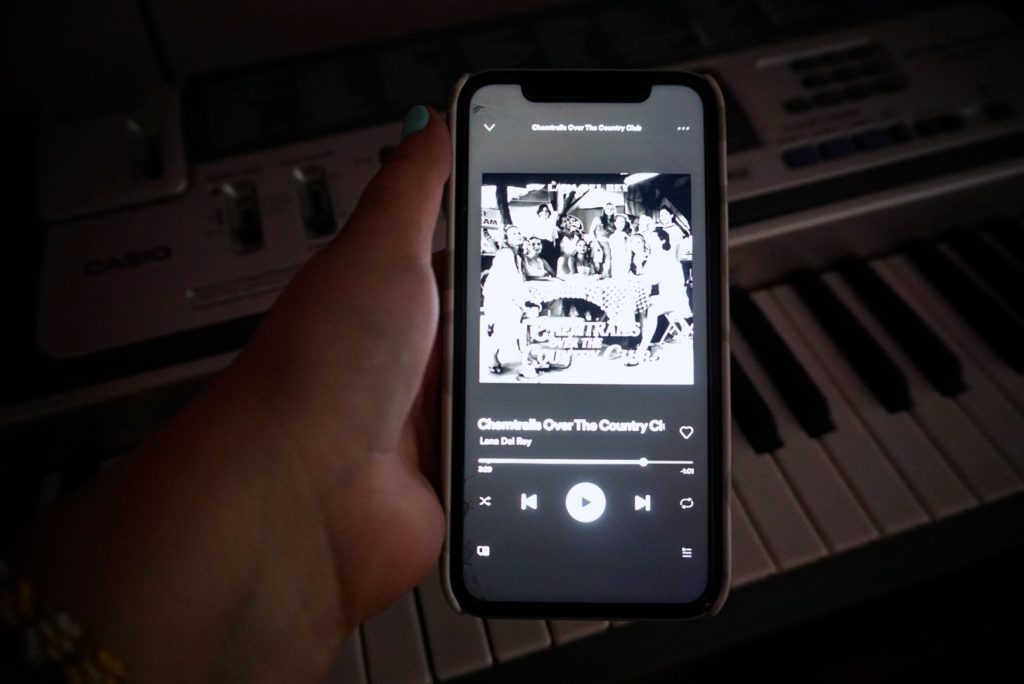By Nicholas Palmer
Going into this album review, I didn’t have much experience with Lana Del Rey, and I will be frank in saying that I never actually listened to a single song of hers before. Recognition by name, despite not knowing of her sonically, I’d heard her name come up quite often as one of the most unique and interesting artists that currently resided in the music industry. As a result, when I heard that she would be coming out with her new album in the early part of 2021, I knew that I would have to give it a try.
To my surprise, I found an album that exceeded any expectations that I had before. With a sound so unlike anything that I had listened to throughout the whole semester, and themes that felt so personal to both the industry and the artist herself, it was a piece that left me thoughtful and reflective. With these points laid out, I think it is important to talk a little about the background of the album.
Chemtrails Over the Country Club is Lana Del Rey’s seventh studio album, as well as her seventh top-ten album in the country. Receiving critical acclaim from upon release, the album deals with topics such as escapism and love — with a tinge of retrospective nostalgia that seems to carry between songs.

Originally set to be released in 2020 but due to manufacturing delays, the release was pushed back to 2021 and released on March 19th. Del Rey states that much of the album is pertained to her “stunning girlfriends” and “beautiful siblings,” revealing a much more emotional, innocent side of her than was previously explored.
In particular, among the high points of the album, I found myself attached to three of her B-sides, along with the title track “Chemtrails Over the Country Club.”
The first song I’ll talk about, “Wild at Heart,” is a song that explores ideas of freedom and love, connecting back to the genuineness of her prior album. The song is often praised for its use of recycling elements from several tracks found in her previous album, creating a bridge from her past self to her current. The slow piano opening features a melody so pure and open that you can hear the strings on the guitar in the recording. The song doesn’t keep itself limited, however, with the end of the pre-chorus creating a small swell into a jazz/folk inspired chorus that is jarring from the verse but intriguing. Another element that is explored on the album that is showcased in success here is her use of dueling vocals, one typically in a higher range, that play off each another. This album had many moments to show off Del Rey’s amazing vocal, with her airy, echoey tone feeling almost spiritual. In its truest essence, this song has a bombastic nature with the varying vocals at the end providing the perfect completion to a song of exploration and experimentation.

The next track after “Wild at Heart” is another of my favorite songs off the album, “Dark But Just A Game.” Beginning with a quote from the song’s producer, Jack Antonoff, the song explores the tragedy many stars face where artists must create a façade of themselves to achieve the fame they desire. As fame tends to be the album’s main antagonistic force, Del Rey refuses to change who she is, being happy and open as the person she is. This theme of identity and truth is played throughout the song and creates a great juxtaposition. For example, in the opening verses, there’s a vocal effect placed on her voice that creates a compressed, almost heavy feeling that is then stripped away for the chorus where her voice is carried and clear.
The song is at its best when it moves between parts. There’s key changes, differences in percussion between tambourines and a deep bass that gives variety and uniqueness from point to point. Finally, as the song begins to fade out, there is this one bit of repetition that provides this almost futile feeling. A song that gets better the more you explore the interesting background elements and the lyrics in attachment to the instrumentation, “Dark But Just A Game” has a strong message that could speak for the music industry as a whole.

The next song I want to turn attention to is the 8th track on the album, “Yosemite.” The song describes a changing relationship and says a great relationship can “stand the test of time” just like anything in nature. Del Rey once described that even if people in the relationship change, it doesn’t necessarily have to be a change that would cause the relationship to come to an end. To Del Rey, she states that this song truly captures the essence of what a relationship ought to be, and its lyrical elements truly carry that message throughout. The beginning carries this atmosphere that’s reflective of a western, with the guitar’s repeated melodic line giving it a haunting feel. As well, the tapping of the soft bongos give the song a fun, fluttery tone as her vocals carry over the instrumentation. As well, the cymbals and synths that kick in just melt into one another and feels like one large sound.
One thing that really captured my interest in this song is how it makes use of some repetitive elements. The guitar never really explores any different melodic lines, but it works in conjunction with the various instrumentation changes and tonal shifts that grounds the song in a bit of commonality. Truly, this song has a lot of interesting things going on that one review cannot truly explore. There’s the bridge where she adds an echo vocal effect on her voice, the screeching in the background at points, and more that leaves the listener encapsulated in a song that seems to end far too quickly, despite its lengthy run time.

Finally, there is the title track for the album “Chemtrails over the Country Club.” In this quieter piece, Del Rey contrasts the imagery of chemtrails, often the focus of many conspiracy theories, with the serenity of suburban life. A ballad that speaks right to the artist’s strength, she creates a landscape that speaks to the true essence of life, commenting on the lavishness and happiness often created in suburban ignorance. There’s a supernatural quality to her vocals that caught me the first time I heard this song; something that would be reinforced throughout the rest of the album. There’s a slight reverb in her voice that slightly dissuades itself from purity. It adds a layer of insecurity just like the suburbia that she comments on. One interesting element of the song is how Del Rey plays with the weight in her voice. At times it can feel so light as if it would float from word to word, and other times it feels so dense that it could be felt within the listener themselves. Into the final verses of the song, the build up with the percussion and synth in the background creates this anticipation for one final exploration. As the song fades away, there is this repetition of the drum that leaves the song unsettling, as if there’s more to be explored; a quality that I find to be intriguing, and leaves the listener anticipated for the other tracks to come.
For myself, there were a lot of high points on the album. I found the tone to be quite unique and starkly different from what many of the top artists in the industry are doing, which creates a style and message that is quite Del Rey’s own. As well, while there were not any large tonal shifts throughout the album, the variations and experimentations that take place are quite interesting. The more you listen, the more appreciation they’ll get. While I would have preferred a couple songs that maybe broke the form a little, perhaps one with a third verse or one that had a fast opening, I have to say no song on the album left me disappointed and it was difficult to pick favorites to analyze in more detail. While I have no basis of which to rate this album in comparison to Del Rey’s past works, it left me wanting more and genuinely interested in her work. While this style of music is not one that I typically listen to, her stellar vocals and her careful instrumentation, along with deep lyrical themes that carry from song to song, really make this an album that stands out in the year so far.
 GHQ.fm 95.3 FM – Gainesville | Ocala | The Beat of the Gator Nation
GHQ.fm 95.3 FM – Gainesville | Ocala | The Beat of the Gator Nation
